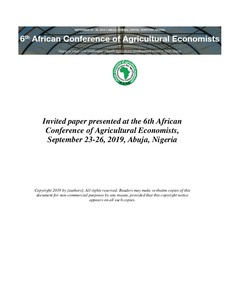An evaluation of the impact of soil carbon enhancing practices on farm output in Western Kenya
Sustainable agricultural practices that enhance soil carbon simultaneously improve farm
yields and income. Despite the expansive literature on adoption of soil carbon practices in
Kenya, there is limited information on the impact of the elemental practices on farm output.
This study attempts to fill this literature gap by evaluating the impact of soil carbon practices
on farm output in Western Kenya. Results show that agroforestry, maize-legume
intercropping, terracing and use of inorganic fertilizer are dominant soil carbon practices.
Howbeit, the propensity score matching results reveal that maize-legume intercropping solely
has observable impact on farm output. On average, farmers involved in the practice have an
increase of 27% on maize output as opposed to those who don’t, and as such adoption could
improve their welfare. The findings suggests that interventions targeted on facilitating the
uptake of maize-legume intercropping among resource-poor rural smallholder farmers should
be pursued.

